UDHAN: Training in Uganda to benefit people with vision impairment in Somalia
Kampala – Being a person with a disability in Somalia is not easy.
Years of war and civil strife have meant that the country’s social services are still rebuilding, with the Somali authorities and civil society groups at the forefront of those efforts.
There are an estimated 2.5 million persons with disabilities in the Horn of Africa country, including about 360,000 people with vision impairment – two of these are Abdirahman Mohamud Kulane and Abdulkadir Mohamed Abdullahi, who recently found themselves in the Ugandan capital.
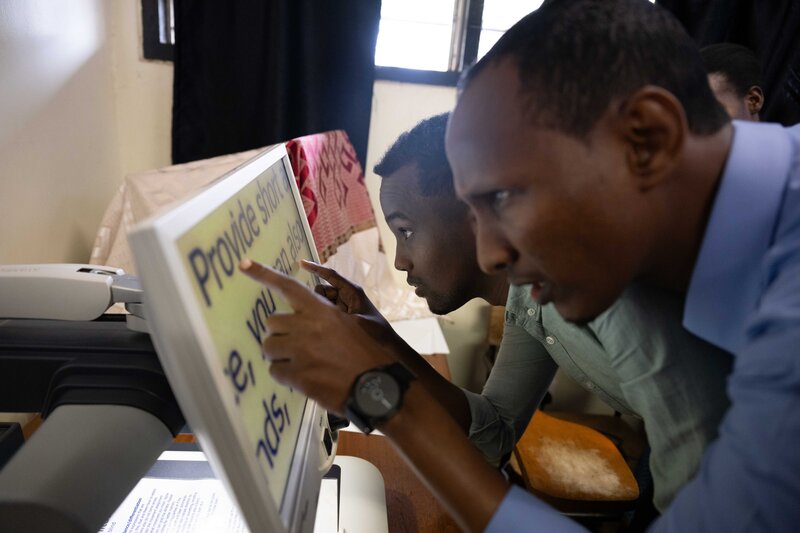
“We came here for an important matter – the training we are taking is extremely important both personally and for the visually impaired youth in Somalia,” Mr. Abdullahi says.
The two visually-impaired men were recently in Kampala for a week-long training on Braille production.
Named after its inventor, Braille is a tactile representation of alphabetic and numerical symbols using six dots to represent each letter and number. It can be used by people who are blind or have low vision to read the same books and periodicals as those printed in a visual font.
From skills to literacy
The Braille production training programme was conducted at Kyambogo University’s School of Special Needs and Rehabilitation, a pioneering institution that has trained specialists in visual disabilities since 1988.

“Braille literacy is a key pillar for visually impaired individuals. It breaks barriers and minimizes the challenges they face,” says Odette Niyisabwa, the Head of the Visual Impairment Studies Department at the university.
The training combined instruction with hands-on practice.
“We learned about various aspects of this technology. We explored different types of paper used for the machines, and became familiar with various machines,” Mr. Abdullahi explains.
Additionally, the young trainees learned how to use tools that ‘emboss’ – that is, print in the Braille system, and can ‘transcribe’ or convert regular text and images into the system, thus facilitating reading and access to information.
The practical lessons also included learning how to proofread Braille documents, and techniques to maintain the machines – essential skills that can be applied in their daily work in Somalia.
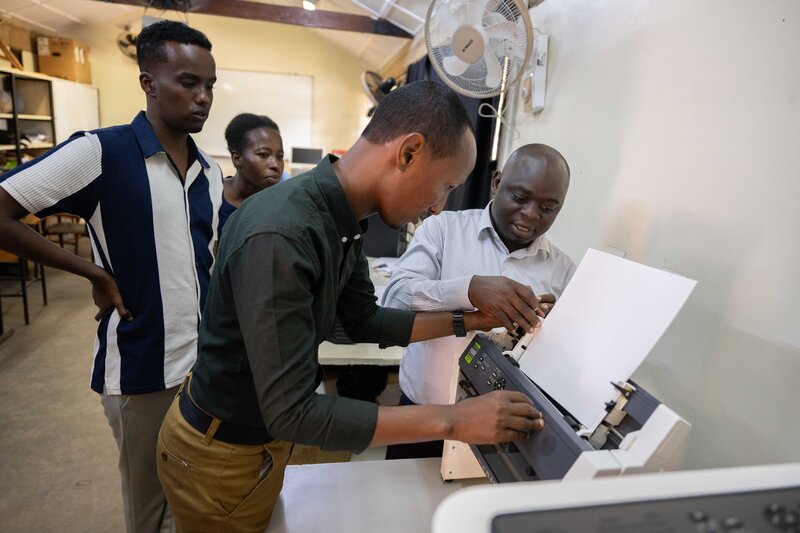
“We have certain tools and resources, like machinery, for which we had not previously received adequate training,” says Mr. Abdullahi.
“This training is essential for us because it fills the gaps,” the 32-year-old adds. “We hope to acquire more knowledge and skills and we plan to use what we have learned to benefit our people when we return to Somalia.”
Beyond the technical training, the workshop emphasized human rights.
“This training supports our efforts to protect human rights, particularly the rights of Somali persons with disabilities,” Mr. Abdullahi says. “We are committed to applying the principles of justice and equality that we have learned, and must always advocate for human rights as outlined by the United Nations.”
The activists say the experience in Kampala was illuminating, with the opportunity to visit local businesses operated by visually impaired people providing encouraging examples.
“This trip was extremely informative,” says Mr. Kulane. “We visited a store where we saw tools and equipment used by visually impaired individuals. We also visited libraries and were impressed by the resources available.”

Championing human rights
But neither Mr. Kulane nor Mr. Abdullahi were undertaking the training for themselves.
The pair are also activists. They share a long-term commitment to raise awareness in Somalia about the rights of persons with disabilities, and in 2020 co-founded the Somali Youth Organization for the Visually Impaired, or UDHAN as it is known in its Somali acronym.
“UDHAN stands for awareness, education, and advocacy for the rights of Somalis with disabilities, especially the blind,” says the 28-year-old Mr. Kulane.
“Various tools are used to assist people with visual impairments, and these have advanced over time… there is a notable difference because the available resources are very limited in Somalia,” Mr. Abdullahi notes.
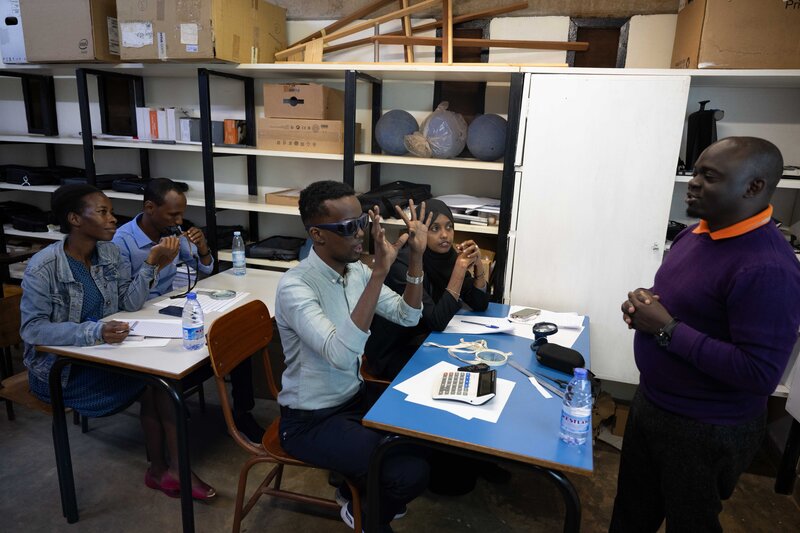
With UN support channeled via the second phase of the Joint Programme on Human Rights, UDHAN organized the training in Kampala as a step toward building the infrastructure needed for Somalia’s visually impaired community, particularly in terms of access to education.
Milestones reached
In December last year, the United Nations commended the Federal Government of Somalia for its progress in promoting the rights and inclusion of persons with disabilities. This included reaching significant milestones such as the ratification of the UN Convention on the Rights of Persons with Disabilities, establishing the National Disability Agency (NDA) and cabinet’s approval of the Disability Protection Bill which was recently passed by the Federal House of the People.
In 2023, significant progress was made with the NDA’s launch of the National Priorities and Perceptions of Persons with Disabilities Report by, along with the validation of a five-year Strategy and Action Plan.
“We are very active in promoting the new Disabilities Protection Bill and hope it will advance soon to help guarantee the rights of everybody,” the UN Secretary-General's Acting Special Representative for Somalia, James Swan, told the two men and other UDHAN members at a meeting before the Kampala training.
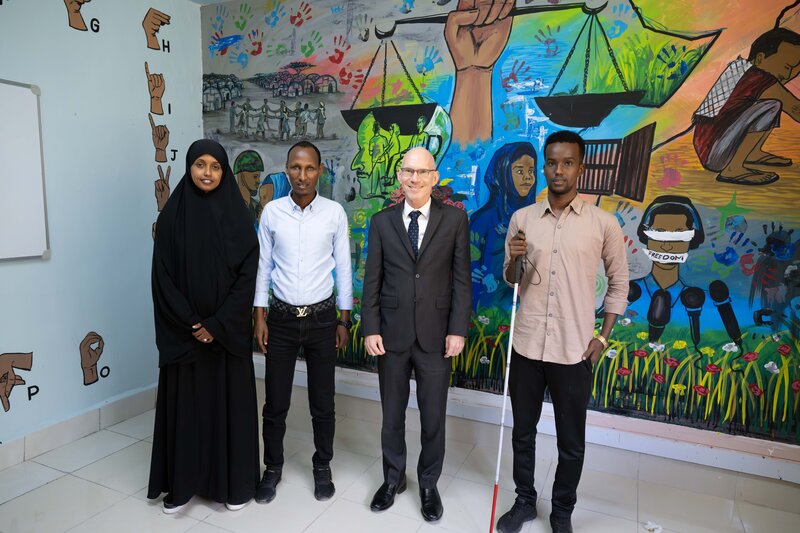
“Finding ways to make sure that people have access to resources, to communication opportunities, is very important,” Mr. Swan added.
The top UN official in Somalia underlined that that the UN support to the work of UDHAN was part of a “broader effort to make sure that many others are also included fully in the society and in the in the work of the nation.”
The UN Children’s Fund (UNICEF) and the UN Assistance Mission in Somalia (UNSOM), the latter of which is headed by Mr. Swan, are the world body entities which are members of the Joint Programme on Human Rights.
Led by the federal Ministry of Family and Human Rights Development and supported by international donors, the Joint Programme aims to ensure that Somali citizens know their rights and have access and the capacity to effectively engage and hold accountable their local authorities, and that local duty-bearers, Federal Member States and district authorities are capacitated to promote and protect human rights.
Visualizing through Braille
With about 100 members, UDHAN aims to advance the conversation about human rights and inclusion of persons with disabilities, including their access to education and employment opportunities.
For example, students with visual impairments were disadvantaged, struggling to obtain accessible learning materials. During exams, they face additional challenges.
“An appointed teacher reads the questions aloud, and the student responds orally while the teacher writes down the answers,” says UDHAN member Hamdi Hussein Osman who, while not visually impaired, shares its passion for human rights and inclusion.
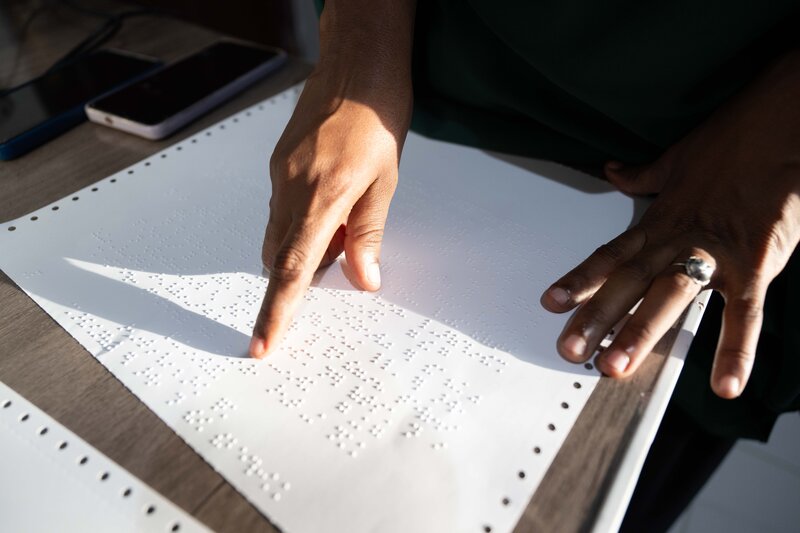
She adds that that that process was “full of potential errors that could unfairly impact students' performance.”
While UDHAN had obtained a Braille production machine, they had little experience using it. The training in Kampala sought to change this by equipping Mr. Kulane and Mr. Abdullahi with the skills to independently produce Braille documents using various tools available to them, and to train others in Somalia. Overall, this will provide better access to information, making the educational field more equitable.
A friendly match
Towards the end of the training week, the team from UDHAN was invited to a friendly goalball match with local students from Kyambogo University’s School of Special Needs and Rehabilitation.
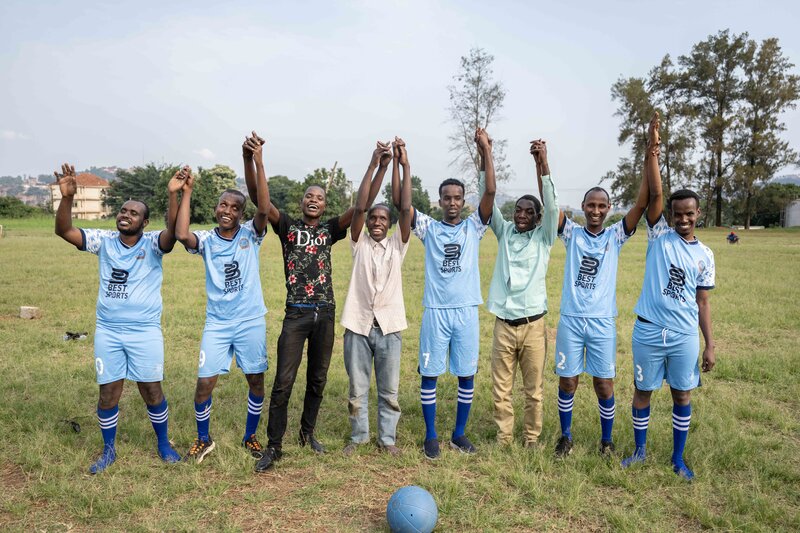
A version of the classical football game and designed specifically for people with some form of vision impairment, goalball is a team sport in which participants compete to throw a ball past the opposing team and into their net to score points. The ball emits a ringing sound to guide the players.
UDHAN’s team lost to their Kampala counterparts, but that was fine with Mr. Abdullahi and Mr. Kulane.
"It wasn't just a game or exercise – it was also an opportunity for interaction and exchanging bonds with our visually-impaired brothers and sisters,” says Mr. Kulane. “In addition to our training on Braille, this was a great experience we had in Kampala!”
 UN
UN





